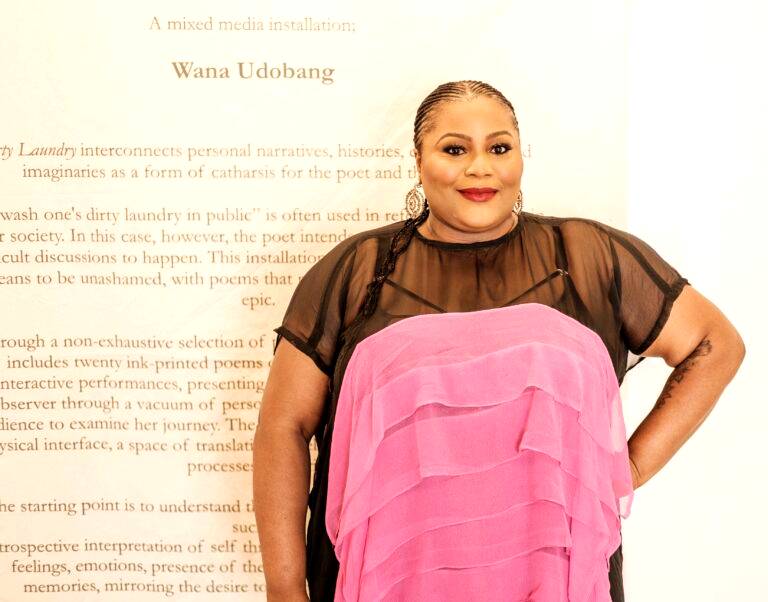May 23, 2022
Right from the door of the Whitespace Hall, you could see women sitting in twos, doing their laundry and chatting, live. While admiring the innovativeness in such activity, the hanging poems beckon you to Wana Udobang’s “Dirty Laundry”, an exhibition conceived as an insight into private entanglements.
In all ramifications, Nigeria’s charming poet, Wana Udobang’s mixed media installation exhibition- “Dirty Laundry”, offers a refreshing viewpoint on visual art exhibition presentation. It is as unique as it is innovative, laying credence to art evolving as a viable tool to drive transformation in the society. The beautifully constructed verses connect personal narratives, histories, experiences, and imaginaries as a form of relief for the poet and the viewer.Udobang, a multidisciplinary creative, took her installation’s title from her debut spoken word poetry album; an autobiographical work that aims to tackle burning issues relating to abuse and domestic violence.The idea of this exhibition has been on my mind for like ten years now. I was performing at Bogobiri at the time and I was performing this poem that was very emotional for me. So, I was crying. The lines in the poem were nostalgic for my brother and I, and as we reminisced on our past experiences, my brother suggested we put our dirty laundry outside. I liked that idea of putting our dirty laundry in public, through poems”.
The show curated by Naomi Edobor, held in collaboration with the global philanthropy organisation, Ford Foundation, between April 28 and April 30, 2022, at Whitespace Ikoyi, Lagos. The exhibition travels to two other cities in Nigeria- Port-Harcourt and Abuja, to celebrate this year’s women’s month and 16 days of activism against gender-based violence.
Featuring thought provoking and emotive poems screen-printed on canvas hanging from laundry lines, the installation showed alongside spell-binding performances that explore issues around womanhood, sexual and gender violence, feminine agency, healing, and re-imagination. There were also, talk presentations and online discussions bothering on the role of art in social justice movements or activism that seeks to create change.
The hanging poems- “Epitaph For Girls Who Want To Stay A Little Longer”, which addresses the issue of domestic violence prevalent in the society; “Thick Skin”; “Family Portrait”; “Dorothy”; “My Uncle Squeezed the Tube Into My Hands”; “Things You Will Learn When Your Father Leaves”, etc, narrate many personal stories for observers to experience while walking through the space, a physical representation of the metaphor “hanging your dirty laundry in public.”
The installation examines what it means to be unashamed, with poems that range in scope from intimate to epic. The title of the installation Udobang explained, “Is a metaphor for shame. When you are putting your dirty laundry out there in the public, it’s like you are putting out your business for everyone to see. It’s an invitation for us to remove shame from our lives essentially, and also speak about the things that we always hide, especially as women”.The relevance and timelines of materials in ‘Dirty Laundry’, speak eloquently of how long sexual abuse and domestic violence have endured in the society. “A lot of these stories are my personal stories and other people’s stories. The poem titled, “Dorothy”, is about my mother. I wrote some of these poems about eight years ago and it goes to show what’s happening to people in Nigeria. It’s sad that we’ve been hiding these stories for too long because Nigeria has a way of suppressing people”, the artist said. In “Dorothy”, the poet chronicles the life of a woman who in spite of her virtuous lifestyle is ill-treated by her husband. “This is the story of a woman. Who swapped her name for a band and three letters. Working her face through knockout punches. Straddleing babies on her back. This is the story of a woman, whose hands were battered from the match. She balled her fist to conceal her fears. This is the story of a woman, who was taught that you must behave well, That you do not leave the warmth of your home, Even if the heat will kill you, you stay till it singes your bones…This is the story of a woman, who learnt to mask her cravings…, Wore her shame like pearls with ease…Whose story will be the wind that soaks the dust.”






